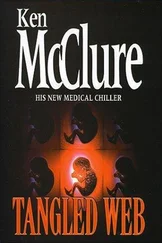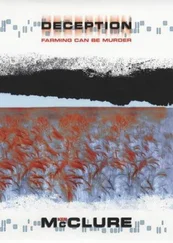Ken McClure - Pandora's Helix
Здесь есть возможность читать онлайн «Ken McClure - Pandora's Helix» весь текст электронной книги совершенно бесплатно (целиком полную версию без сокращений). В некоторых случаях можно слушать аудио, скачать через торрент в формате fb2 и присутствует краткое содержание. Год выпуска: 1997, ISBN: 1997, Издательство: Simon & Schuster, Жанр: thriller_medical, на английском языке. Описание произведения, (предисловие) а так же отзывы посетителей доступны на портале библиотеки ЛибКат.
- Название:Pandora's Helix
- Автор:
- Издательство:Simon & Schuster
- Жанр:
- Год:1997
- ISBN:978-0-684-48163-7
- Рейтинг книги:4 / 5. Голосов: 1
-
Избранное:Добавить в избранное
- Отзывы:
-
Ваша оценка:
- 80
- 1
- 2
- 3
- 4
- 5
Pandora's Helix: краткое содержание, описание и аннотация
Предлагаем к чтению аннотацию, описание, краткое содержание или предисловие (зависит от того, что написал сам автор книги «Pandora's Helix»). Если вы не нашли необходимую информацию о книге — напишите в комментариях, мы постараемся отыскать её.
Pandora's Helix — читать онлайн бесплатно полную книгу (весь текст) целиком
Ниже представлен текст книги, разбитый по страницам. Система сохранения места последней прочитанной страницы, позволяет с удобством читать онлайн бесплатно книгу «Pandora's Helix», без необходимости каждый раз заново искать на чём Вы остановились. Поставьте закладку, и сможете в любой момент перейти на страницу, на которой закончили чтение.
Интервал:
Закладка:
“As opposed to what?”
“As opposed to just providing you with more data about your virus vectors.”
“Hopefully it will do both,” said Pereira.
“I have to know the chances,” insisted Neef.
Pereira seemed to sense that this might be the big money question. He stopped sifting through his papers and said, “All right, I admit, it would be nice to include some Neomycin tag experiments just to see how the vectors are distributed in the body.”
“No,” said Neef firmly.
“Why not?”
“Adult cancer patients are able to make up their own mind about helping medical science when there’s nothing in it for them. Kids can’t.”
“But their parents...”
“Will snatch at anything without fully understanding the implications so it’s me who has the final say-so round here and I say, no data experiments.”
Pereira sighed and let his head drop for a moment. “So what’s the deal?” he asked.
“The deal is that if we inject any Gene Therapy vector into my patients, it has to carry a viable gene with a real chance of improving my patients’ condition. Do you have such vectors?”
“Yes, I believe we do,” said Pereira. “And I believe that they’ll work. Given the right patients and the right conditions, I think we can pull off the big one here. I think we might be able eventually to zap cancer.”
“You honestly believe that?”
“I honestly do.”
Neef nodded non-committally. “Good. Now tell me about the side effects of this kind of therapy.”
“There really shouldn’t be any, certainly nothing like the side effects of standard chemotherapy.”
“Good. Can we get down to specifics? What gene do you intend introducing and why?”
Pereira separated a couple of diagrams from his pile of papers and pushed them in front of Neef. “For suitable tumours we would use a disabled murine leukaemia virus with altered envelope proteins and carrying a thymidine kinase gene (TDK). This would be injected directly into the tumour. The virus only infects dividing cells so, in the case of a brain tumour only the tumour cells will take up the TDK gene. We then treat the patient with Gancyclovir. This drug will only kill cells containing a working TDK gene.”
“It sounds simple in theory. Are you sure that only the tumour cells will be killed?”
“That’s what the theory says.”
Neef wondered if Pereira’s answer had been evasive but didn’t press the point for the time being. “What about different types of tumour?” he asked.
“Menogen’s success has been in developing a range of pseudotype viruses based on the virus I mentioned. They all have altered envelope proteins which gives them different affinities. It’s just a question of selecting the right vector for the right tumour.”
“Okay,” said Neef, after a moment’s thought. “That’s enough science. Let’s go meet everyone.”
After noting the unit nurses’ somewhat puzzled and muted response to meeting Pereira, Neef wondered what the patients were going to make of him. In the event, they treated Pereira with much the same caution the nurses had displayed. They seemed to sense that his smile was less than sincere and didn’t respond to his clumsy attempts at making jokes.
“I hope he’ll grow on me,” confided Kate Morse as she stood beside Neef, watching Max through the window of her office.
“That’s my hope too,” agreed Neef with a slight smile. “God knows what the ethics committee are going to make of him.”
“Mr Beavis was here earlier to see Thomas Downy,” said Kate. “He’s going to speak to you personally but...”
“Not operable?”
“Fraid not.”
“Damn, I hoped Beavis might give it a try.”
“Thomas’ parents are coming in at four. Will you be around or do you want Lawrence to tell them.”
“I’ll do it,” said Neef with a sigh of resignation. “I should be back by then.”
Neef called Tim Heaton from his office while Max was still with the children. ‘So far I think I’m in favour of the trial. Pereira’s a bit hard to take but he seems to know what he’s talking about.”
“Good,” said Heaton. “I understand from Phillip and Andrew that they are quite happy with the financial arrangements. I’ll try to convene the ethics committee for two thirty. Can we all have an early lunch, say twelve thirty?”
“Fine.”
Pereira returned to Neef’s office after giving up on making meaningful contact with the patients. “Okay,” he announced spreading his hands out from his sides, “Michael Jackson, I ain’t. I’m a scientist.”
“Not everyone gets on with kids,” said Neef with a smile.
“I don’t dislike them,” replied Pereira. “But I don’t go all misty eyed over them. Is that a problem?”
“I suppose not but I like to understand people’s motivations when I’m going to be working with them.”
“That must be difficult when most people in this game don’t tell the truth in the first place,” said Pereira.
“A cynical view.”
“A realistic one. In my experience, doctors become doctors because they figure it’ll provide them with a good living, social standing, nice car, membership of the golf club and so on. Any thoughts about fixing sick folks come way down the list. But they’ve got a good PR thing going for them, I’ll give them that. Most people believe they care.”
Neef was taken aback by Pereira. He was also puzzled. The words sounded as if they had been born of bitterness but Pereira didn’t sound bitter. He said it all quite dispassionately.
“So what motivates a medical scientist?” he asked.
Pereira smiled and said, “People like to believe it’s an unswerving desire to cure man’s ills and alleviate pain and suffering but it ain’t. No sir. Scientists are people like everyone else. They’re fired by notions of career advancement and increased academic status, all mixed up with the prospects of fame and fortune.”
“That sounds pretty awful.”
“It only sounds awful,” said Pereira. “In practice the system works very well from the patients’ point of view.”
“How so?”
“Researchers work their butt off, not because they want to help sick folks but because they want to be first past the post; there are no prizes for coming second. They know there’s a whole bunch of guys out there doing exactly the same sort of experiments. That means that the work has to get done as fast as possible. It’s also done as thoroughly as possible because every researcher knows that his competitors are just waiting to go through his published work with a fine-tooth comb to pick fault with it. And if they find any mistakes or unjustified assertions, they’ll crucify you, so no short cuts. The patient gets a good deal.”
“You paint an honest if somewhat depressing picture,” said Neef with a wry smile.
“I just face facts,” said Pereira. “Human nature is what it is. I accept it. Lots of folks don’t. They have to endow their actions with all sorts of noble sounding bullshit.”
“Between you and me, Max,” said Neef, “I wouldn’t come out with that to the ethics committee this afternoon. They just might take it personally.”
“Thanks for the warning.”
Half way through lunch Neef’s bleeper went off. He excused himself and went to call the unit.
“We’ve just had a referral from East Side General,” said Lawrence Fielding. “I think you should come over.”
Neef hurried back to the unit and found Fielding in the light-wall room. This was a long narrow room next to the duty room. One entire wall was translucent plastic with a fluorescent light source behind it. Scans and X-rays could be pinned up on it for examination.
“What have you got?” asked Neef as he entered and found Fielding examining a series of three X-rays with the aid of a hand-held lens.
Читать дальшеИнтервал:
Закладка:
Похожие книги на «Pandora's Helix»
Представляем Вашему вниманию похожие книги на «Pandora's Helix» списком для выбора. Мы отобрали схожую по названию и смыслу литературу в надежде предоставить читателям больше вариантов отыскать новые, интересные, ещё непрочитанные произведения.
Обсуждение, отзывы о книге «Pandora's Helix» и просто собственные мнения читателей. Оставьте ваши комментарии, напишите, что Вы думаете о произведении, его смысле или главных героях. Укажите что конкретно понравилось, а что нет, и почему Вы так считаете.












